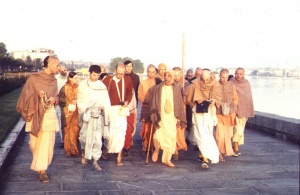CC Adi 10.30: Difference between revisions
m (1 revision(s)) |
No edit summary |
||
| Line 1: | Line 1: | ||
{{ | [[Category:Sri Caitanya-caritamrta - Adi-lila Chapter 10|C030]] | ||
<div style="float:left">'''[[Sri Caitanya-caritamrta|Śrī Caitanya-caritāmṛta]] - [[CC Adi|Ādi-līlā]] - [[CC Adi 10|Chapter 10: The Trunk, Branches and Subbranches of the Caitanya Tree]]'''</div> | |||
<div style="float:right">[[File:Go-previous.png|link=CC Adi 10.29|Ādi-līlā 10.29]] '''[[CC Adi 10.29|Ādi-līlā 10.29]] - [[CC Adi 10.31|Ādi-līlā 10.31]]''' [[File:Go-next.png|link=CC Adi 10.31|Ādi-līlā 10.31]]</div> | |||
{{CompareVersions|CC|Adi 10.30|CC 1975|CC 1996}} | |||
{{RandomImage}} | |||
==== TEXT 30 ==== | ==== TEXT 30 ==== | ||
<div | <div class="verse"> | ||
caitanya-pārṣada—śrī-ācārya purandara | :caitanya-pārṣada—śrī-ācārya purandara | ||
pitā kari’ yāṅre bale gaurāṅga-sundara | :pitā kari’ yāṅre bale gaurāṅga-sundara | ||
</div> | </div> | ||
| Line 12: | Line 16: | ||
==== SYNONYMS ==== | ==== SYNONYMS ==== | ||
<div | <div class="synonyms"> | ||
caitanya- | ''caitanya-pārṣada''—associate of Lord Caitanya; ''śrī-ācārya purandara''—Śrī Ācārya Purandara; ''pitā''—father; ''kari’''—taking him; ''yāṅre''—whom; ''bale''—says; ''gaurāṅga-sundara''—Lord Caitanya Mahāprabhu. | ||
</div> | </div> | ||
| Line 19: | Line 23: | ||
==== TRANSLATION ==== | ==== TRANSLATION ==== | ||
<div | <div class="translation"> | ||
Śrī Ācārya Purandara, the ninth branch, was a constant associate of Lord Caitanya’s. The Lord accepted him as His father. | Śrī Ācārya Purandara, the ninth branch, was a constant associate of Lord Caitanya’s. The Lord accepted him as His father. | ||
</div> | </div> | ||
| Line 26: | Line 30: | ||
==== PURPORT ==== | ==== PURPORT ==== | ||
<div | <div class="purport"> | ||
It is described in the Caitanya-bhāgavata that whenever Lord Caitanya Mahāprabhu visited the house of Rāghava Paṇḍita, He also visited Purandara Ācārya immediately upon receiving an invitation. Purandara Ācārya is to be considered most fortunate because the Lord used to greet him by addressing him as His father and embracing him in great love. | It is described in the ''Caitanya-bhāgavata'' that whenever Lord Caitanya Mahāprabhu visited the house of Rāghava Paṇḍita, He also visited Purandara Ācārya immediately upon receiving an invitation. Purandara Ācārya is to be considered most fortunate because the Lord used to greet him by addressing him as His father and embracing him in great love. | ||
</div> | </div> | ||
__NOTOC__ | |||
<div style="float:right; clear:both;">[[File:Go-previous.png|link=CC Adi 10.29|Ādi-līlā 10.29]] '''[[CC Adi 10.29|Ādi-līlā 10.29]] - [[CC Adi 10.31|Ādi-līlā 10.31]]''' [[File:Go-next.png|link=CC Adi 10.31|Ādi-līlā 10.31]]</div> | |||
__NOTOC__ | |||
__NOEDITSECTION__ | |||
Revision as of 04:29, 21 July 2021
Śrī Caitanya-caritāmṛta - Ādi-līlā - Chapter 10: The Trunk, Branches and Subbranches of the Caitanya Tree

His Divine Grace
A.C. Bhaktivedanta Swami Prabhupada
A.C. Bhaktivedanta Swami Prabhupada
TEXT 30
- caitanya-pārṣada—śrī-ācārya purandara
- pitā kari’ yāṅre bale gaurāṅga-sundara
SYNONYMS
caitanya-pārṣada—associate of Lord Caitanya; śrī-ācārya purandara—Śrī Ācārya Purandara; pitā—father; kari’—taking him; yāṅre—whom; bale—says; gaurāṅga-sundara—Lord Caitanya Mahāprabhu.
TRANSLATION
Śrī Ācārya Purandara, the ninth branch, was a constant associate of Lord Caitanya’s. The Lord accepted him as His father.
PURPORT
It is described in the Caitanya-bhāgavata that whenever Lord Caitanya Mahāprabhu visited the house of Rāghava Paṇḍita, He also visited Purandara Ācārya immediately upon receiving an invitation. Purandara Ācārya is to be considered most fortunate because the Lord used to greet him by addressing him as His father and embracing him in great love.